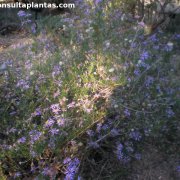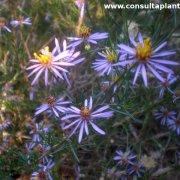Care of the plant Felicia filifolia or Wild aster |
|
The genus Felicia, family Asteraceae, includes 60 species of annual plants and subshrubs native to Tropical and Southern Africa. Some species are: Felicia filifolia, Felicia amelloides, Felicia pappei, Felicia bergeriana. Common names: Wild aster, Fine-leaved felicia, Needle-leaved felicia. This species is native to South Africa. They are bushy plants with hanging branches that reach 1 meter (3.28 feet) in height. The leaves are thin, needle-shaped and bright light green. The abundant lilac or bluish flowers with a yellow center almost cover the plant. Blooming can be from mid-winter to late spring and repeat in autumn. Wild aster is used in rockeries, on dry slopes, to cover low walls and in hanging pots. It's ideal for Mediterranean coastal gardens. Felicia filifolia can grow in semi-shade exposure but in full sun they bloom more abundantly. It resists occasional frost down to -5 ºC (23 ºF). Fine-leaved felicia can be grown in any well-drained soil, be it poor or calcareous; it appreciates that it contains organic matter. Water moderately all year long, waiting for the substrate to dry well. Wild aster resists drought well. Fertilize with compost in autumn and with mineral fertilizer every 20 days in spring. Prune wilted flowers (year-round) and lightly prune after the first annual bloom so that more flowers emerge in the fall. Wild aster is a plant resistant to typical pests and diseases. Needle-leaved felicia propagates by division in the fall or by seeds sown in their final location in late summer or early fall. |
Images of the plant Felicia filifolia or Wild aster |
Find plants
Felicia filifolia or Wild aster | Care and Growing
© 2026 FavThemes

